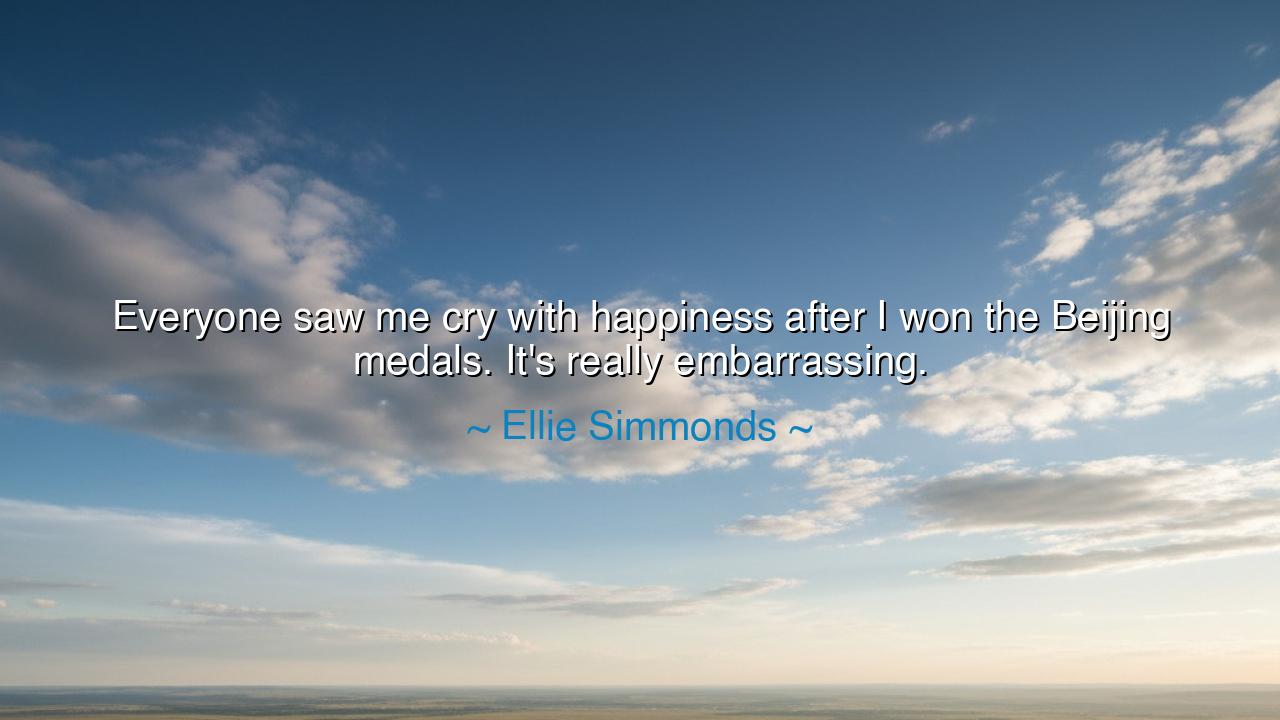
Everyone saw me cry with happiness after I won the Beijing
Everyone saw me cry with happiness after I won the Beijing medals. It's really embarrassing.






In the humble and heartfelt words of Ellie Simmonds, the celebrated Paralympic swimmer, she once said: “Everyone saw me cry with happiness after I won the Beijing medals. It’s really embarrassing.” Though spoken with modesty and laughter, these words carry a deep and timeless truth — that joy, when pure and overwhelming, reveals the deepest part of the soul. In her tears, we see not weakness, but the overflowing of triumph after struggle, the release of years of unseen sacrifice, the human heart laid bare in its most honest form. To call such a moment embarrassing is merely the humility of one who does not yet see that tears, when born from victory and gratitude, are among the noblest offerings of the spirit.
To the ancients, tears were sacred. The poet Homer wrote of warriors who wept openly after battle, their tears not signs of frailty, but of humanity’s divine depth. Achilles wept for his fallen friend Patroclus; Odysseus wept upon seeing his homeland after years of exile. Their tears were not of despair, but of recognition — the awareness of life’s fragility, the joy of endurance, the beauty of returning to the light after long darkness. So when Ellie Simmonds, standing before the world, wept in the glow of her Beijing medals, she was not merely emotional — she was ancient. Her tears were the same as those shed by heroes before her, the expression of a truth that words could never contain.
For Ellie, her journey to that moment was not an easy one. Born with achondroplasia, she entered a world that often misunderstands difference, yet she chose to rise above limitation and define herself by will, not circumstance. The years of training, the early mornings, the endless repetition, the self-doubt, and the quiet hope — all came to life in that instant. When victory came, her happiness could not be contained within speech; it burst forth as tears. And though she calls it embarrassing, those tears are her crown — for they tell a story of triumph over fear, of a child’s dream realized through courage.
It is in such moments that emotion becomes truth. Many are taught to hide their tears, to wear strength as armor and pride as mask. But the ancients knew that one who weeps from joy is closer to the gods than one who hides behind false composure. When Simmonds wept, the world saw something far greater than an athlete; they saw the universal spirit of victory that lives in every human heart — the spirit that endures pain, dares to hope, and finds in the end not arrogance, but gratitude. To cry with happiness is to acknowledge that life is precious and that success, no matter how great, is never achieved alone — but through love, struggle, and divine grace.
There is a long tradition of such tears among the truly great. When the composer Beethoven finished his Ninth Symphony — deaf, broken, yet filled with music — the audience erupted in applause. He could not hear their cheers, but when he turned and saw them standing, his eyes filled with tears. Not from sadness, but from the overwhelming joy of creation fulfilled. So too did Ellie Simmonds, in her own way, experience that transcendent joy: the merging of effort and destiny, of human limitation and divine strength. Her embarrassment is but the shy grace of one who has touched eternity and returned to the mortal world, humbled by its beauty.
Let this truth be passed down to all generations: never be ashamed of tears that come from happiness. They are the language of the soul, the water that purifies the heart. In a world that often worships control, vulnerability is an act of courage. When joy overwhelms you — when you see your dream fulfilled, when you hold victory in your hands — do not suppress the tears that rise. Let them fall, for they are proof that you have loved deeply, strived nobly, and lived fully.
The lesson of Ellie Simmonds is clear: happiness is not meant to be hidden; it is meant to be felt, even if it comes with trembling hands and wet eyes. The embarrassment she speaks of is but the humility of greatness — the awareness that joy, like light, is blinding when it finally arrives. So, let all who strive remember: it is noble to cry when happiness overtakes you, for in that moment, you are closest to truth, to love, and to life itself.
Thus, the teaching concludes: Ellie Simmonds’ tears were not a weakness but a victory — the visible sign of a soul in harmony with its destiny. The world saw her cry, and in those tears, they saw themselves — every battle fought, every dream pursued, every quiet hope carried through dark nights. Such moments remind us that even the greatest triumph is human at its core, and that happiness, when it comes, is not to be hidden, but to be celebrated — even if it comes in tears.






AAdministratorAdministrator
Welcome, honored guests. Please leave a comment, we will respond soon